-
Search -
Accessibility -
Members Login





Our work
Member working groups provide a platform for members to exchange information and to identify opportunities for collective advocacy.
We encourage members’ active involvement in the these working groups.
Please contact the staff members leading the group if you are interested in participating.
Stay updated and engaged in issues linked to humanitarian coordination and in-country humanitarian operations.
For more information and to join the group contact Coordination@icvanetwork.org

Building on his background in coordination, community engagement and network development, Jeremy is a strong advocate for NGOs in interagency coordination, policy and advocacy mechanisms. He previously served as ICVA’s Regional Representative for Asia and the Pacific, and worked in partnerships for UNOCHA, following 15 years working in development for government, NGO and private sectors across Asia-Pacific region and in his home country of Australia.
Jeremy previously led ICVA’s policy work on the localization of humanitarian action including authoring several papers on this topic. He holds a master’s degree in International Development Studies and a degree in Behavioural Science.

Albert-Philip joined humanitarian action in 2005, during the Darfur crisis. Since then, he has deployed for various NGOs on a number of humanitarian crises, including South Sudan, Chad and Pakistan, but has also worked on development in contexts such as DPR Korea and post-Ebola Sierra Leone, and on mine action in Guinea. He was a country director for over 10 years, and the coordinator for the INGO forum in Mali in 2020.
He was ICVA West and Central Africa Representative in 2021, before joining the Humanitarian Coordination department in 2022.

Gabriela joined ICVA in April 2023 as Senior Policy Officer. Her work on Forced Migration focuses notably in supporting NGOs to collectively participate in and influence global processes and mechanisms to ensure these are inclusive, contextualised, and effective in supporting NGOs to meet the needs of those affected by crisis.
Over the past five she has worked with several NGOs and foundations in the development and humanitarian sectors in advocacy, coordination and external engagement. Prior to joining ICVA, she worked with World Vision International on Education in Emergencies on advocacy as well as on technical front through a deployment to support the Ukrainian crisis response.
Gabriela holds a bachelor’s degree in Multilingual Communication and a master’s degree in Standardization, Social Regulation and Sustainable Development from the University of Geneva.
ICVA contributes to the global humanitarian coordination discussions through our participation as a “standing invitee” in the Inter-Agency Standing Committee (IASC).
We connect our members and NGO fora partners with the various IASC processes, encouraging members to feed into the discussions that are ongoing at the global level. Members provide a feedback loop with the reality of what is actually happening in the various operational settings to the broad policy level thinking at the global level.
ICVA members have increased access to IASC information and policy developments through the ICVA working groups, and provide feedback on a range of IASC interim guidance notes.
ICVA and its members participate in the following IASC bodies:
ICVA also engages with the following groups associated with the IASC:
ICVA has also developed guidance for NGO Representatives on the Humanitarian Country Team Terms of Reference.
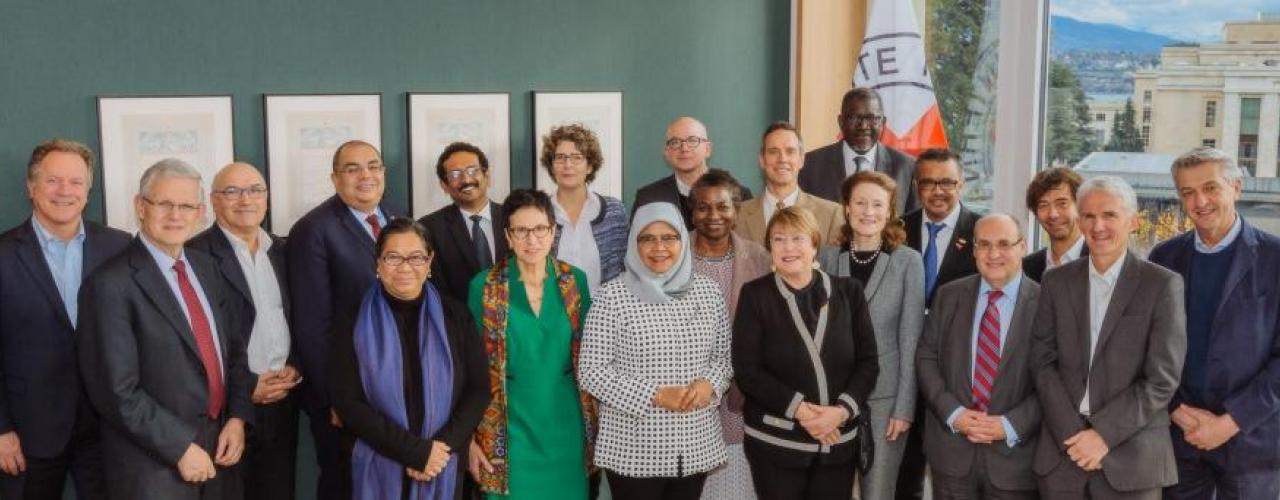
The Inter-Agency Standing Committee is the longest-standing and highest-level humanitarian coordination forum of the UN system, bringing together the executive heads of 18 UN and non-UN organisations to ensure coherence of preparedness and response efforts, formulate policy, and agree on priorities for strengthened humanitarian action.
ICVA is a standing invitee to the IASC.
More information on the IASC can be found on their website.
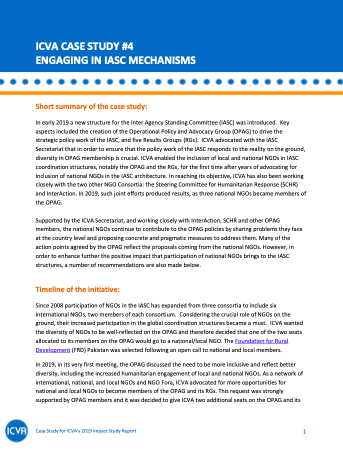
Following the introduction of the revised structure of the IASC in 2019, ICVA advocated with the IASC Secretariat that in order to ensure that the policy work of the IASC responds to the reality on the ground, diversity in OPAG membership is crucial. ICVA enabled the inclusion of local and national NGOs in IASC coordination structures, notably the OPAG and the Results Groups, for the first time after years of advocating for inclusion of national NGOs in the IASC architecture.
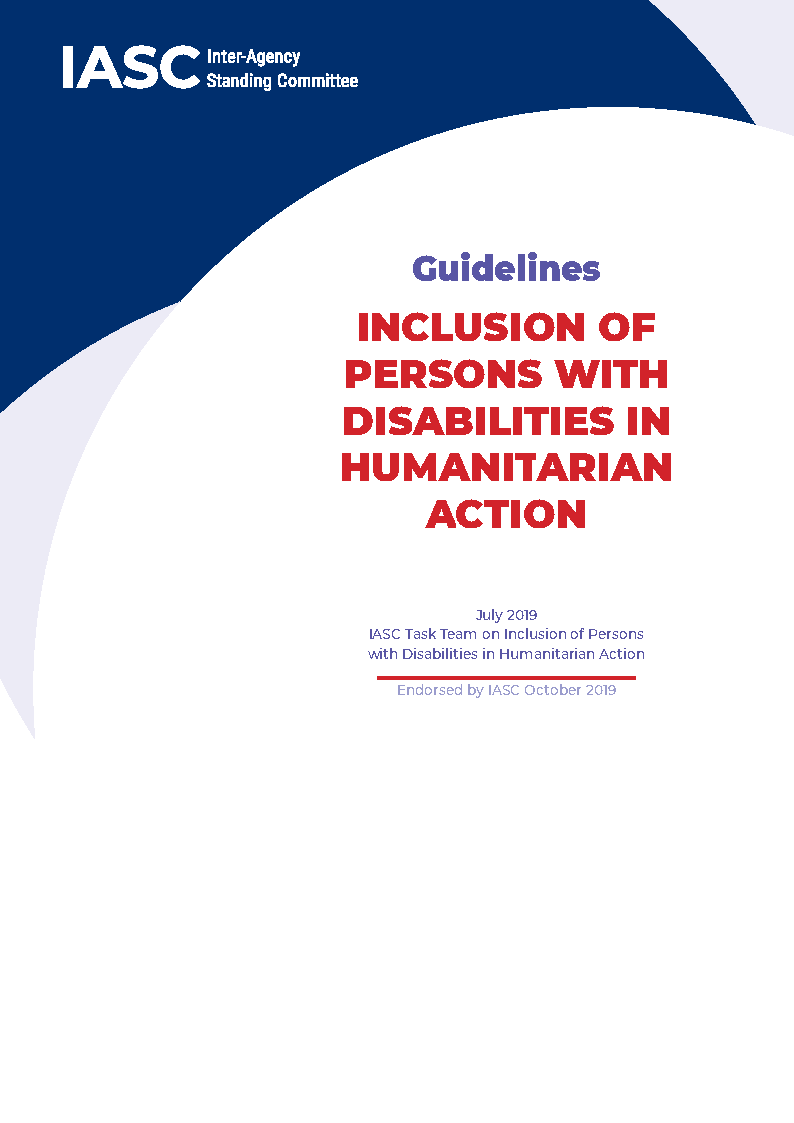
The guidelines set out essential actions that humanitarian actors must take in order to effectively identify and respond to the needs and rights of persons with disabilities who are most at risk of being left behind in humanitarian settings.
ICVA regularly hosts meetings with humanitarian leaders for open discussions with members and other interested NGOs.
These exchanges provide an opportunity to share information, increase understanding of the crisis/country context, and find ways for UN agencies and NGOs to better support each other in order to better serve the affected and host population.
Through ICVA, NGOs contributed to the annual appraisal of humanitarian coordinators conducted by the EDG. The feedback received from members working directly with the coordinators is much valued and helps shape the crucial role of the humanitarian coordinators in general.
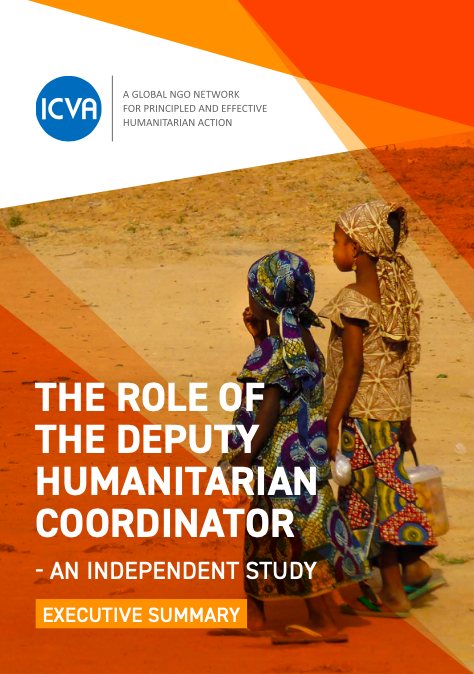
This report presents an overview of recent Deputy Humanitarian Coordinator roles and perceptions of the role within the humanitarian community as well as best practices and lessons learned to inform and improve management of the Deputy Humanitarian Coordinator role.
The study found that while the role of Deputy Humanitarian Coordinator has evolved organically and has often been managed in an ad hoc manner, the role is often perceived by humanitarian actors as bringing a strong added value to a humanitarian response. When used to address context-specific needs, it is a powerful tool for supporting principled and effective humanitarian aid across challenging coordination landscapes.
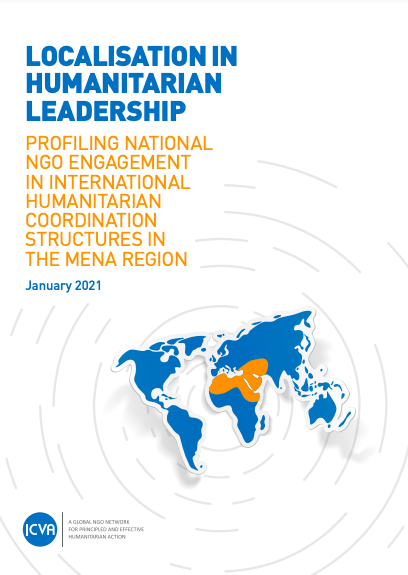
Against the current background of sustaining local responses, ICVA initiated this research aiming at mapping and documenting the extent of effective and meaningful NNGOs engagement in international humanitarian coordination structures. Focusing in specific at MENA region, the research explores NNGOs engagement in Humanitarian Country Teams (HCTs), Country-Based Pooled Fund (CBPF) Advisory Boards, and sector or cluster coordination platforms. The contexts covered are Iraq, Jordan, Lebanon, Libya, the occupied Palestinian territories, Syria (Damascus and Turkey-based operations as well as the Whole of Syria response), and Yemen. Drawing on both qualitative and quantitative data, this research briefly profiles national leadership within the seven responses across MENA and outlines the state of NNGO engagement across the region.
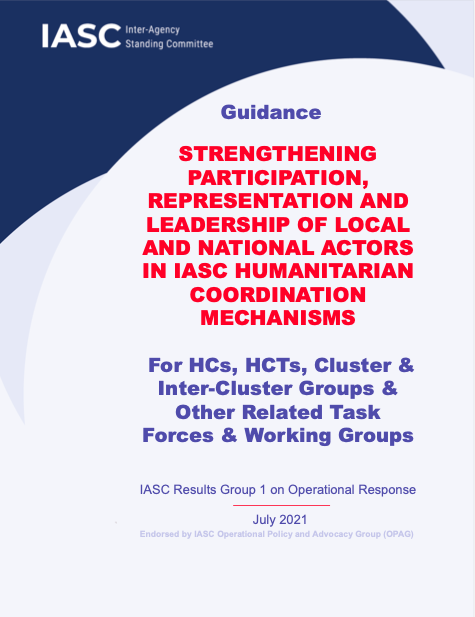
This guidance note has been developed to support efforts to strengthen the meaningful participation, representation, and leadership of local and national humanitarian actors (L/NAs) within IASC humanitarian coordination structures. It draws on over 100 pieces of research and good practice to provide recommendations on how L/NAs can be an integral part of humanitarian coordination structures. It provides guidance for Humanitarian Coordinators, Humanitarian Country Teams, Cluster and Inter-Cluster Coordination Groups, and other related Task Forces and Working Groups.

Draft minutes from the 19th General Assembly, held on 20 March 2024. These minutes will be approved by the members attending the 20th General Assembly on 18 March 2025.

This guidance note has been developed to support efforts to strengthen the meaningful participation, representation, and leadership of local and national humanitarian actors (L/NAs) within IASC humanitarian coordination structures. It draws on over 100 pieces of research and good practice to provide recommendations on how L/NAs can be an integral part of humanitarian coordination structures. It provides guidance for Humanitarian Coordinators, Humanitarian Country Teams, Cluster and Inter-Cluster Coordination Groups, and other related Task Forces and Working Groups.

Following the introduction of the revised structure of the IASC in 2019, ICVA advocated with the IASC Secretariat that in order to ensure that the policy work of the IASC responds to the reality on the ground, diversity in OPAG membership is crucial. ICVA enabled the inclusion of local and national NGOs in IASC coordination structures, notably the OPAG and the Results Groups, for the first time after years of advocating for inclusion of national NGOs in the IASC architecture.
ICVA aims to help improve humanitarian preparedness and response by increasing the effectiveness of NGO coordination in humanitarian contexts and their links with other humanitarian coordination mechanisms.
Independent NGO coordination fora play a valuable role in ensuring humanitarian coordination remains accountable and effective. ICVA provides ongoing support to national and international NGO fora through the NGO fora support programme
Overall, ICVA’s work with NGO fora reinforces the localization approach as a key approach to address humanitarian needs/challenges in-country; and through this process uses the lessons learned to drive and strengthen humanitarian responses nationally and at global engagements.
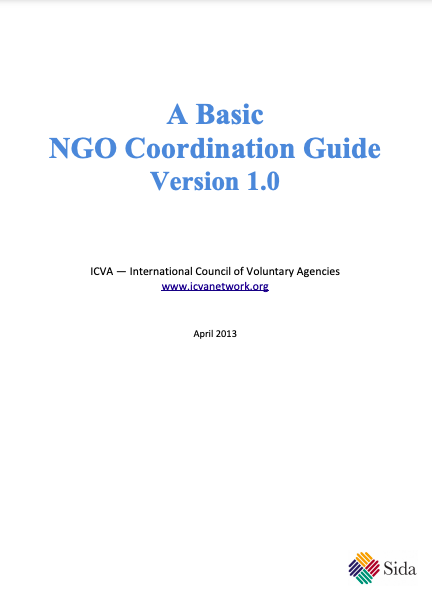
Welcome to a basic Guide on NGO coordination. This Guide is not meant to be a definitive “how to” manual, but it focuses on issues and areas to consider when undertaking NGO coordination and when setting up an NGO coordination body. It is an entry point into the world of NGO coordination – an area of humanitarian response that is vast in practice, but that is also quite limited in terms of documentation and available resources. The Guide is a contribution towards improving NGO coordination so that the wheel does not have to be reinvented by those embarking upon such coordination – whether they be local, national, or international NGOs.
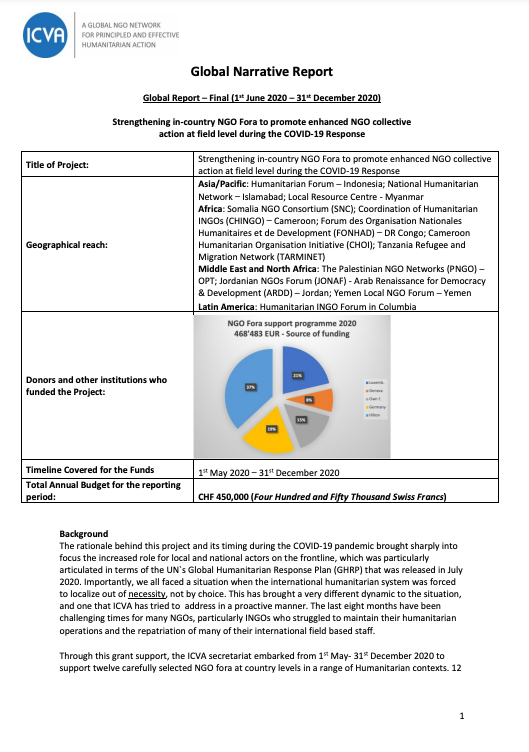
Global Narrative Report Global Report – Final (1st June 2020 – 31st December 2020) of project – Strengthening in-country NGO Fora to promote enhanced NGO collective action at field level during the COVID-19 Response
This project supported 12 in-country NGO Fora (including mainly national, but also mixed and International NGO Fora) in contexts experiencing humanitarian crises along side the pandemic. The project was designed with consultation with NGO fora active in four regions covered by ICVA to support during the COVID 19 pandemic to understand the challenges and role NGO For a in the humanitarian coordination architecture
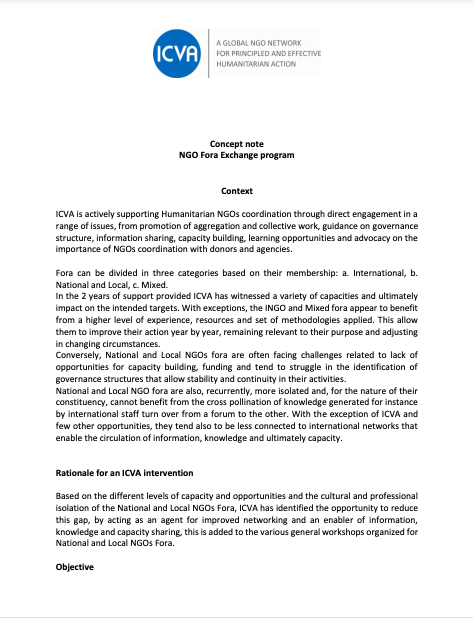
Concept note for ICVA’s NGO fora exchange programme. This programme provides the national and local NGOs Fora with learning opportunities to the work and activity of structured and performing fora in a form of learning exchange programme.
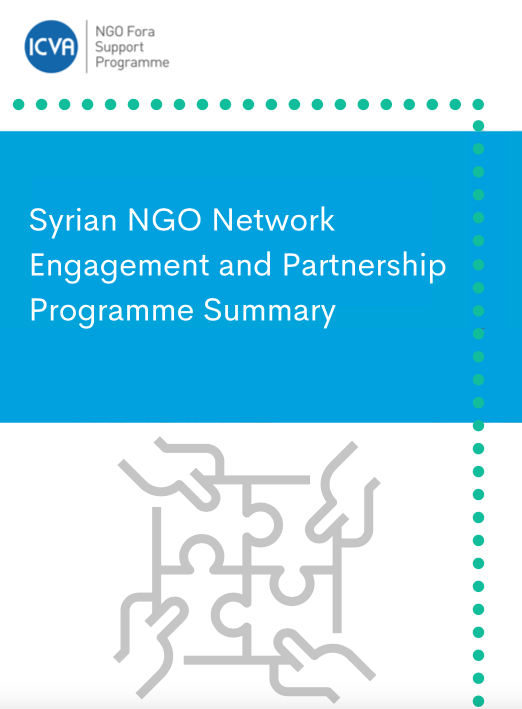
The Syrian NGO Network Engagement and Partnership Programme is a strategic partnership between UNDP and ICVA to strengthen the capacity of Syrian NGO/CSO networks to enable them to play a vital role in joint coordination and representation by strengthening skills and capacity across a range of areas including joint coordination, governance, and strategic planning.
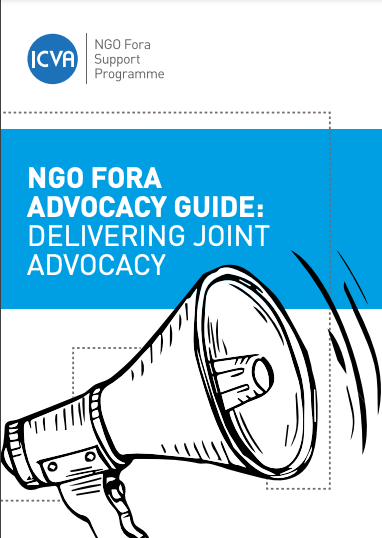
While each NGO fora is unique in its membership, structure, scope and strategic direction, this guide to delivering joint advocacy has been developed to be relevant to humanitarian NGO fora of any size or scale. The components within the guide can be used together, or individually, and may be tailored to the needs of each coordination fora.
The guide looks specifically at components of humanitarian advocacy from a perspective of delivering joint NGO advocacy; it is tailored to the collective advocacy work of NGO Fora.
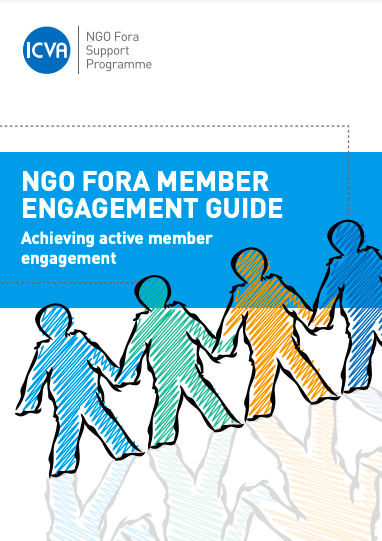
This guide was developed under ICVA’s NGO Fora Support Programme. It presents good practice and key considerations for NGO coordination fora seeking to achieve active and sustained member engagement. Whilst the guide is not definitive, it outlines a variety of considerations to inform member engagement work and is relevant to NGO fora of any size or scale.
The guide provides an overview of NGO fora components alongside basic considerations for member engagement and a detailed overview of member engagement good practices across a range of fora activities and processes.
Click on the below links to read the guide in English, French, Spanish and Arabic.
ICVA’s “Support to NGO Fora programme” aims to support NGO fora to undertake their collective responsibilities, across three key areas:
ICVA is working with NGO fora operating in countries affected by humanitarian crises, including:

This guide was developed under ICVA’s NGO Fora Support Programme. It presents good practice and key considerations for NGO coordination fora seeking to achieve active and sustained member engagement. Whilst the guide is not definitive, it outlines a variety of considerations to inform member engagement work and is relevant to NGO fora of any size or scale.
The guide provides an overview of NGO fora components alongside basic considerations for member engagement and a detailed overview of member engagement good practices across a range of fora activities and processes.
Click on the below links to read the guide in English, French, Spanish and Arabic.

While each NGO fora is unique in its membership, structure, scope and strategic direction, this guide to delivering joint advocacy has been developed to be relevant to humanitarian NGO fora of any size or scale. The components within the guide can be used together, or individually, and may be tailored to the needs of each coordination fora.
The guide looks specifically at components of humanitarian advocacy from a perspective of delivering joint NGO advocacy; it is tailored to the collective advocacy work of NGO Fora.
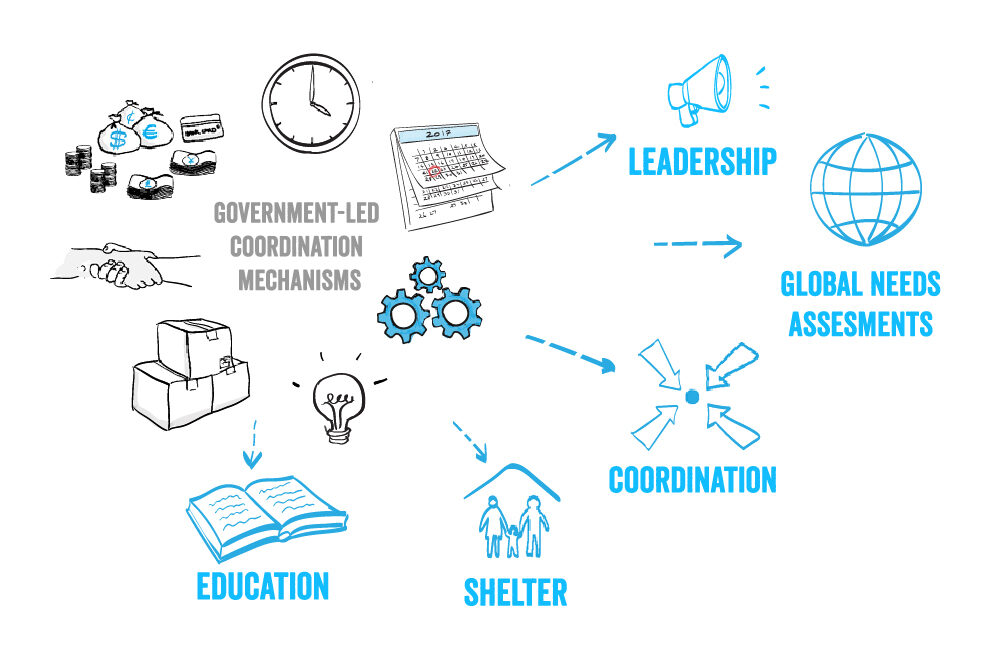
The complexity of emergencies requires that humanitarian actors coordinate their responses effectively. However, many NGOs have only a limited understanding or engagement in the humanitarian coordination mechanisms.
This series includes webinars on the following topics:
I

ICVA is a global network of non-governmental organisations whose mission is to make humanitarian action more principled and effective by working collectively and independently to influence policy and practice.
International Council of Voluntary Agencies
NGO Humanitarian Hub,
La Voie-Creuse 16, 1202, Geneva, Switzerland
Email: secretariat@icvanetwork.org
A curation of monthly updates, latest news, tools, and events around forced migration, coordination, financing, and cross cutting issues all sent straight to your inbox.